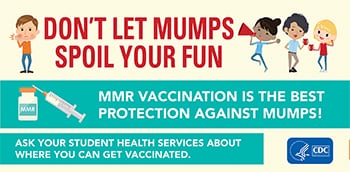
Mumps

Mumps vaccine is the best way to protect yourself against mumps, a contagious disease that can cause serious complications. Talk to your healthcare professional or check your immunization records to ensure mumps vaccine is up to date. Anyone sick with mumps should stay home and away from others for at least 5 days.
Mumps is a contagious disease caused by a virus. You can protect yourself and your family against mumps with vaccination. There is no treatment for mumps, and it can cause long-term health problems. Before there was a vaccine, mumps was the leading cause in the U.S. for viral encephalitis (infection of the brain) and sudden deafness. The most common symptoms include:
- Fever
- Headache
- Muscle aches
- Tiredness
- Loss of appetite
- Swollen and tender salivary glands under the ears on one or both sides
Protect Yourself Against Mumps
Anyone born during or after 1957 who has never had mumps or has never been vaccinated is at risk for mumps. They should get at least one dose of the MMR vaccine. College students who do not have evidence of immunity need two doses of MMR vaccine, separated by at least 28 days. Other adults at higher risk, such as international travelers and healthcare professionals, should also get two doses of MMR vaccine.
Protect Your Child with Mumps Vaccine
Mumps vaccine is the best way to protect your child against mumps. It is usually given as part of a combination vaccine that protects against three diseases: measles, mumps, and rubella (MMR). The MMR vaccine is safe and effective. Most children don’t have any side effects from the vaccine. The side effects that do occur are usually very mild, such as a fever or rash.
Children should get two doses of MMR vaccine:
- the first dose at 12 through 15 months of age, and
- the second dose at 4 through 6 years of age.
Your child’s doctor may also offer the MMRV vaccine, a combination vaccine that protects against four diseases: measles, mumps, rubella, and varicella (chickenpox). Talk to your child’s healthcare professional for help deciding which vaccine to use.
Vaccinated People Can Still Get Mumps
Mumps outbreaks can still occur in highly vaccinated U.S. communities, particularly in settings where people have close, prolonged contact, such as universities and close-knit communities. Some people who get two doses of MMR vaccine may still get mumps if they are exposed to the viruses during these outbreaks. Experts aren’t sure why; it could be that their immune systems didn’t respond as well as they should have to the vaccine or their immune system’s ability to fight the infection decreased over time. However, disease symptoms are generally milder in vaccinated people, and high vaccination coverage helps to limit the size, duration, and spread of mumps outbreaks.
In the event of an outbreak, public health authorities may recommend that people at increased risk get a third dose of MMR to improve their protection against mumps.
Mumps Can Be Serious
In most people, mumps is pretty mild. But it can cause serious, long-lasting problems including
- orchitis (swelling of the testicles) in males who have reached puberty
- oophoritis (swelling of the ovaries) and/or mastitis (swelling of the breasts) in females who have reached puberty
- encephalitis (swelling of the brain)
- meningitis (swelling of the tissue covering the brain and spinal cord)
- loss of hearing (temporary or permanent)
In rare cases, mumps is deadly.
Paying for Mumps Vaccine
Most health insurance plans cover the cost of vaccines. However, you may want to check with your insurance provider before going to the doctor. Learn how to pay for vaccines.
If you don’t have health insurance, or if your insurance does not cover vaccines for your child, the Vaccines for Children (VFC) Program may be able to help. This program helps families of eligible children who might not otherwise have access to vaccines. To find out if your child is eligible, visit the VFC website or ask your child’s doctor. You can also contact your state VFC coordinator.
More Information
- About Mumps
- Mumps Fact Sheet
- Mumps Cases and Outbreaks
- Mumps Vaccination
- MMR (Measles, Mumps, & Rubella) Vaccine: What You Need to Know (Vaccine Information Statement) English or other languages
- Measles, Mumps, and Rubella (MMR) Vaccine Safety
- Brief Answers to Common Questions: Vaccines for Children Program (VFC)
- Parents’ Guide to Childhood Immunizations


































No hay comentarios:
Publicar un comentario